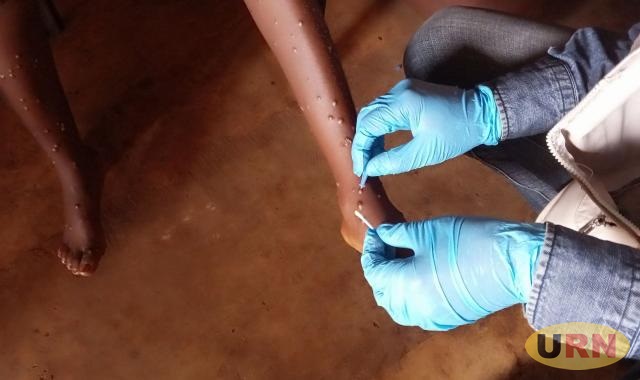
Kampala, Uganda | THE INDEPENDENT | The Africa Centers for Disease Control and Prevention (CDC) have reported that experts are struggling to transport Mpox samples from districts to testing laboratories in Kampala. This challenge poses a risk of exacerbating the already high and increasing rates of transmission of the viral disease.
Uganda has now emerged as one of the top two countries in Africa recording the highest number of Mpox infections, second only to the Democratic Republic of Congo. As of the latest figures shared on Thursday, a total of 4,131 cases have been reported, with 2,479 confirmed as Mpox-positive.
Cases have been recorded in 83 districts, with 52 districts currently reporting active cases. The highest disease burden is concentrated in Kampala, Wakiso, Mbarara, Mukono, Nakasongola, and Luweero, which are showing worrying trends. Giving an update about the status, Prof Yap Boum II, the Assistant Mpox Incident Manager at CDC revealed that while many districts have cases, they are challenged with transportation of samples following the pause of United States foreign funding by President Donald Trump in late January.
Mpox samples are primarily tested at the Uganda Virus Research Institute (UVRI) laboratory in Entebbe and the National Public Health Laboratory in Butabika but Boum reports some samples are stuck in the districts and not reaching their destination.
While Health Minister Dr. Jane Ruth Aceng had earlier told reporters in Kampala that the government is securing funding to fill the gap in all the critical areas in health including surveillance, officials at the Africa CDC say there are interventions planned at the regional level to support the Mpox response.
For instance, Dr. Ngashi Ngongo, the Continental Incident Manager for Mpox said that aware of the fact, US funds have disrupted counter measures for the response and the fact that over 80% of the US health financing was going to Africa, they have come up with several plans including local resource mobilization and taking an analysis to determine the exact gap that exists.
Ngongo further says that they’ve held meetings over the past two days and are getting an impression that there is generally limited information about the waiver the the US government has put in place to ensure that critical areas such as health emergencies keep getting funds.
He advises that the Ministry of Health discusses with the United States Ambassador to get acquainted with what falls in the waiver that’s available for Uganda. He says the same can be done by other countries whose critical services have been disrupted.
Ngashi however noted that like in Uganda, transportation of samples in the Neighboring DRC has become a nightmare which has led to a general decline in testing rates.
*****
URN
 The Independent Uganda: You get the Truth we Pay the Price
The Independent Uganda: You get the Truth we Pay the Price



